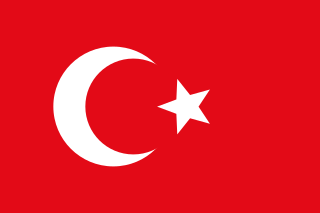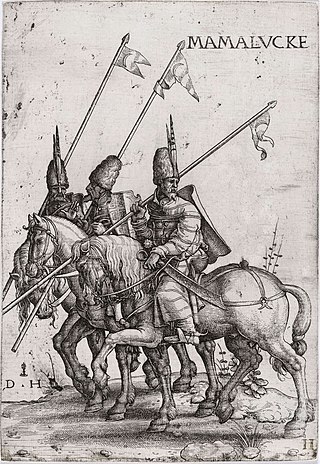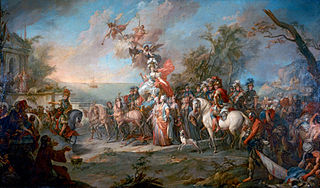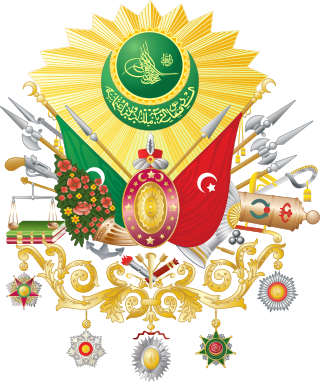
The Ottoman Empire, also called the Turkish Empire, was an imperial realm that controlled much of Southeast Europe, West Asia, and North Africa from the 14th to early 20th centuries; it also controlled parts of southeastern Central Europe, between the early 16th and early 18th centuries.

A janissary was a member of the elite infantry units that formed the Ottoman sultan's household troops. They were the first modern standing army, and perhaps the first infantry force in the world to be equipped with firearms, adopted during the reign of Murad II. The corps was established under either Sultans Orhan or Murad I, and dismantled by Mahmud II in 1826.

Mamluk or Mamaluk were non-Arab, ethnically diverse enslaved mercenaries, slave-soldiers, and freed slaves who were assigned high-ranking military and administrative duties, serving the ruling Arab and Ottoman dynasties in the Muslim world.

Selim III was the sultan of the Ottoman Empire from 1789 to 1807. Regarded as an enlightened ruler, he was eventually deposed and imprisoned by the Janissaries, who placed his cousin Mustafa on the throne as Mustafa IV. A group of assassins subsequently killed Selim.

The Ottoman Interregnum or Ottoman Civil War was a civil war in the Ottoman Empire between the sons of Sultan Bayezid I following their father's defeat and capture by Timur in the Battle of Ankara on 20 July 1402. Although Timur confirmed Mehmed Çelebi as sultan, Mehmed's brothers İsa Çelebi, Musa Çelebi, Süleyman Çelebi, and later, Mustafa Çelebi, refused to recognize his authority, each claiming the throne for himself. This resulted in civil war. The Interregnum would last a little under 11 years, culminating in the Battle of Çamurlu on 5 July 1413, when Mehmed Çelebi emerged as victor, crowned himself Sultan Mehmed I, and restored the empire.

Đorđe Petrović, known by the sobriquet Karađorđe, was a Serbian revolutionary leader who led a struggle against the Ottoman Empire during the First Serbian Uprising. He held the title of Grand Vožd of Serbia from 14 February 1804 to 3 October 1813.

The Battle of Ankara or Angora was fought on 20 July 1402 at the Çubuk plain near Ankara, between the forces of the Ottoman sultan Bayezid I and the emir of the Timurid Empire, Timur. The battle was a major victory for Timur, and it led to the Ottoman Interregnum.

The Russo-Turkish War of 1768–1774 was a major armed conflict that saw Russian arms largely victorious against the Ottoman Empire. Russia's victory brought the Yedisan between the rivers Bug and Dnieper, and Crimea into the Russian sphere of influence. Through a series of victories accrued by the Russian Empire led to substantial territorial conquests, including direct conquest over much of the Pontic–Caspian steppe, less Ottoman territory was directly annexed than might otherwise be expected due to a complex struggle within the European diplomatic system to maintain a balance of power that was acceptable to other European states and avoided direct Russian hegemony over Eastern Europe.

The Orlov revolt was a Greek uprising in the Peloponnese and later also in Crete that broke out in February 1770, following the arrival of Russian Admiral Alexey Orlov, commander of the Imperial Russian Navy during the Russo-Turkish War (1768–1774), at the Mani Peninsula. The revolt, a major precursor to the Greek War of Independence, was part of Catherine the Great's so-called "Greek Plan" and was eventually suppressed by the Ottomans.

The First Serbian Uprising was an uprising of Serbs in Orašac against the Ottoman Empire from 14 February 1804, to 7 October 1813. The uprising began as a local revolt against the Dahije, who had seized power in a coup d'état. It later evolved into a war for independence, known as the Serbian Revolution, after more than three centuries of Ottoman rule and brief Austrian occupations.

Devshirme was the Ottoman practice of forcibly recruiting soldiers and bureaucrats from among the children of their Balkan Christian subjects and raising them in the religion of Islam. Those coming from the Balkans came primarily from noble Balkan families and rayah (poor) classes. It is first mentioned in written records in 1438, but probably started earlier. It created a faction of soldiers and officials loyal to the Sultan. It counterbalanced the Turkish nobility, who sometimes opposed the Sultan.

The military of the Ottoman Empire was the armed forces of the Ottoman Empire. It was founded in 1299 and dissolved in 1922.

The Auspicious Incident or Auspicious Event was the forced disbandment of the centuries-old Janissary Corps by Ottoman Sultan Mahmud II on 15 June 1826. Most of the 135,000 Janissaries revolted against Mahmud II, and after the rebellion was suppressed, most of them were executed, exiled or imprisoned. The disbanded Janissary corps was replaced with a more modern military force.

Russo-Turkish wars or Russo-Ottoman wars were a series of twelve wars fought between the Russian Empire and the Ottoman Empire between the 16th and 20th centuries. It was one of the longest series of military conflicts in European history. Except for four wars, the conflicts ended in losses for the Ottoman Empire, which was undergoing a long period of stagnation and decline; conversely, they showcased the ascendancy of Russia as a European power after the modernization efforts of Peter the Great in the early 18th century.

Hadji Mustafa Pasha was an Ottoman commander and politician of Greek Muslim origin who lived in Sanjak of Smederevo. He fought in the Austro-Turkish War (1788–1791) and the Russo-Turkish War (1768–1774). In the period between 1793 and 1801 he was Vizier of the Sanjak of Smederevo. On 15 December 1801 he was murdered by Kučuk-Alija, one of four rebel Janissary leaders (dahije) who took control over the sanjak.

Ahmed Niyazi Bey was an Ottoman revolutionary, who was the bey of the Resne area in the late 19th and early 20th centuries. An ethnic Albanian, Niyazi was one of the heroes of the 1908 Young Turk Revolution and of suppressing the 1909 countercoup as he played leading roles in both events. Niyazi is also known for the Saraj, a French-style estate he built in Resne.
Čorbadžić is a Bosniak family name. The name derives from Turkish language word çorbacı ) which was a military rank of the corps of Janissaries in the Ottoman Empire, used for the commander of an orta, i.e., approximately corresponding to the rank of colonel. The word is pronounced in Turkish and literally means "soup cook", derived from çorba, "soup". Janissaries wore spoons on their head dress, and every rank in the corps were kitchen related.

The Agha of the Janissaries or Janissary Agha was a top Ottoman military official and courtier, and the commander of the Janissary corps. Apart from the commander-general of the entire corps, the title of "Agha of the Janissaries" was also borne by the commanders of provincial garrisons of Janissaries.
Jamaković is a Bosniak family name. It is derived from the Ottoman Turkish word Yamak, which is a member of the local Ottoman Muslim auxiliary troops. Amar Jamaković was a revolutionary leader of a subdivision of Second Handžar Division.
The Ottoman army was the military structure established by Mehmed II, during his reorganization of the state and the military. This was the major reorganization following Orhan's standing army of janissaries that were paid by salary rather than booty or fiefs. This army was the force during the rise of the Ottoman Empire. The organization was twofold, central (Kapıkulu) and peripheral (Eyalet). This army was forced to disband by Sultan Mahmud II on 15 June 1826 in what is known as Auspicious Incident, which followed a century-long reform effort.

















